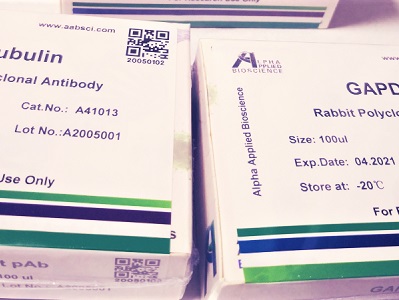

PRK1 (phospho-Thr774)/PRK2 (phospho-Thr816) rabbit pAb
Cat :A20210
-
Source
Rabbit
-
Applications
WB
-
Reactivity
Human,Mouse,Rat
-
Dilution
WB 1:1000-2000
-
Storage
-20°C/1 year
-
Specificity
This antibody detects endogenous levels of Human Mouse Rat PRK1 (phospho-Thr774) or PRK2 (phospho-Thr816)
-
Source/Purification
The antibody was affinity-purified from rabbit serum by affinity-chromatography using specific immunogen.
-
Immunogen
Synthesized phosho peptide around human PRK1 (Thr774) and PRK2 (Thr816)
-
Uniprot No
Q16512
-
Alternative names
Serine/threonine-protein kinase N1 (EC 2.7.11.13) (Protease-activated kinase 1) (PAK-1) (Protein kinase C-like 1) (Protein kinase C-like PKN) (Protein kinase PKN-alpha) (Protein-kinase C-related kinase 1) (Serine-threonine protein kinase N)
-
Form
Liquid in PBS containing 50% glycerol, 0.5% BSA and 0.02% sodium azide.
-
Clonality
Polyclonal
-
Isotype
IgG
-
Background
protein kinase N1(PKN1) Homo sapiens The protein encoded by this gene belongs to the protein kinase C superfamily. This kinase is activated by Rho family of small G proteins and may mediate the Rho-dependent signaling pathway. This kinase can be activated by phospholipids and by limited proteolysis. The 3-phosphoinositide dependent protein kinase-1 (PDPK1/PDK1) is reported to phosphorylate this kinase, which may mediate insulin signals to the actin cytoskeleton. The proteolytic activation of this kinase by caspase-3 or related proteases during apoptosis suggests its role in signal transduction related to apoptosis. Alternatively spliced transcript variants encoding distinct isoforms have been observed. [provided by RefSeq, Jul 2008],
-
Concentration
1 mg/ml
| Product | Reactivity | Applications | Conjugation | Catalog | Images |
|---|
-
 400-836-3211
400-836-3211
-
 support@aabsci.com
support@aabsci.com
-
β-actin rabbit pAb ...... >
-
β-actin rabbit pAb(A284) ...... >
-
Plant-actin rabbit pAb ...... >
-
β-tubulin mouse mAb(M7) ...... >
-
GAPDH mouse mAb(2B8) ...... >
-
GAPDH mouse mAb(PT0325) ...... >
-
Histone H3 rabbit pAb ...... >
-
Histone H3 rabbit pAb ...... >
-
COX IV mouse mAb(6C8) ...... >
-
GFP-Tag mouse mAb(1G6) ...... >
-
HA-Tag mouse mAb(1B10) ...... >
-
mCherry-Tag mouse mAb(6B3) ...... >










 400-836-3211
400-836-3211
